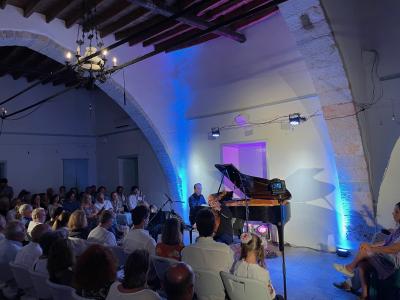Music festival keeps elegance alive on Greek holiday island

PATMOS — From Malia to Magaluf, Mediterranean islands have been developing an unenviable reputation for thumping disco music and bad behaviour -- The Greek island of Patmos is seeking to coax visitors in an opposite direction, offering chamber music played by some of the best artists in the world. The Patmos Chamber Music Festival, which wound up its second season this summer, seeks its inspiration from the island’s history as a cultural crossroads and as a centre of Orthodox Christian pilgrimage due to the presence in the first century AD of the author of the biblical Apocalypse.
The founders are two Italians, Massimo Fino, an expert on musical manuscripts, and Roberto Prosseda, an acclaimed pianist. Fino and Prosseda collaborated on a long-running music festival in Tuscany and decided to apply the experience of the Opera Barga Festival to a remote island in the Aegean near the coast of Turkey.
Patmos became a fashionable destination for members of the European cultural elite in the 1960s, thanks in part to the influence of Teddy Millington-Drake, a well-connected painter, travel writer and friend of the author Bruce Chatwin.
The founders enlisted the support of Greek cultural and political authorities and financial backing from sponsors. “Princess Marina of Greece was our guest. She thanked me 'for having brought Salzburg to Patmos’,” Fino said.
The main Greek organiser is Nada Geroulanos, a veteran of the island who once organised an impromptu recital by Yehudi Menuhin in the garden of the Old School House of Chora, now used as a location by the festival.
Among the star musicians attending this year were the husband and wife teams of Michael Guttman, the violinist, and his cellist wife Jing Zhao, and Prosseda, who alternated at the piano with his wife Alessandra Ammara. There were also rising stars from the Armenian musical scene, the much-admired violinist Anush Nikogosyan, and the pianist Maya Oganyan, aged just 17.
The formula for attracting top musicians is based on the beauty of the Patmos locations, a collaborative approach to the choice of music — the artists are invited to suggest what and where they would like to play — and friendship among the participants.
“Here it is not the fee that draws the musicians. It’s the place and the other musicians. They all receive the same symbolic payment,” Fino said.
Last year the most expensive item was transporting a hired Fagioli 228 grand piano from Piedmont to Patmos by lorry and ferry, and this year the organisers faced a logistical challenge in getting a Yamaha C2 from the local theatre, which it had never left, to two locations in a village on the top of a mountain.
The organisers were told it was impossible, but the operation was overseen by Mauro Buccitti, one of Italy’s most experienced piano technicians, who looked after the pianos in exchange for a free holiday with his family. “Contributions made out of friendship are the hallmark of this festival. It’s right that people who have obtained much from their careers should give something back,” Buccitti said.
Prosseda, the other founder, confirmed the friendship formula behind the festival. “I realised how much the pleasure of making music depended on the context in which I found myself. It depends a lot on the human climate,” he said.
“It’s not easy to get to Patmos, but beautiful things require an effort,” Prosseda said. “This festival is not part of the star system. It’s the stars who want to come. They know where they are going, they know what they will find, and they are happy to be here.”
Prosseda has big plans for his little festival. Next year he wants to bring a full-sized orchestra and then to take the Patmos formula to major European capitals.
“Food is nutriment but it becomes a part of us. The same should be true of music. It’s what remains inside you for your whole life. It makes us understand who we are,” Prosseda said.
Christophe Coin, a renowned French cellist, said he had come to the five-day festival for a variety of reasons. “The other musicians are among the best in the world and Patmos is a beautiful place,” he said. “I have worked all through August, so this is a working holiday.”
The festival finds itself in a tussle for the future of the island between the money brought by mass tourism and a more elite cultural tourism attracted by its quiet character, preserved until recently by the authority over civic affairs of the Orthodox Church.
Organisers recognise that the content of the music may be elitist but the gate policy is not: access to the concerts is free of charge.
After just two years Patmos is already among the top three music festivals of the dozen or so held on Greek islands during the summer, according to Dimitrios Kiousopoulos, a Greek music critic. “It is really international, it has top artists and a serious programme,” he said. “The young Armenians are very good, very well chosen.”
At the end of the first movement of a Brahms trio, which had seen a passionate dialogue between the violin of Nikogosyan and the cello of Zhao, the Italian man sitting behind me exclaimed: “Mamma mia!” As a heartfelt expression of admiration, it left the traditional “bravo” in the shade.
jp-ppw
© COPYRIGHT ITALIAN INSIDER
UNAUTHORISED REPRODUCTION FORBIDDEN


